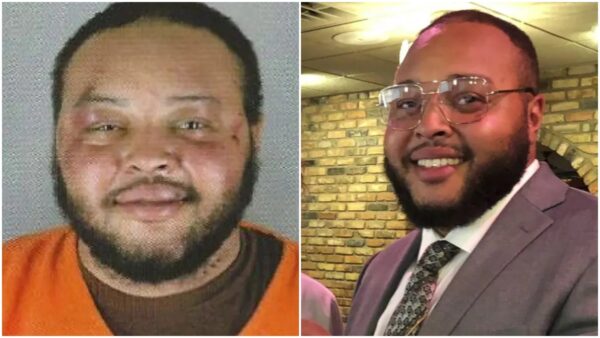Minneapolis to Pay Army Vet Who Was Beaten to a Pulp After Returning Fire At Officers In Unmarked Vehicles $1.5M; Terms Include No Admission of Guilt
The city of Minneapolis has settled a case for over $1 million with an Army veteran who filed a lawsuit against the municipality and its employees after his civil rights were violated.
Jaleel Stallings (Mugshot/Personal Photo)
He sued the city after he was acquitted of shooting at law enforcement on the grounds of self-defense, and says the lawsuit was never about “a check,” but “justice and accountability.”
On Tuesday, May 17, Jaleel Stallings was offered and accepted a $1.5 million-plus costs and attorney fees settlement from the city of Minneapolis.
The lawsuit, obtained by Atlanta Black Star, accused officers in the Minneapolis Police Department of lying about the May 30, 2020 incident, including their instructions to police to “deliberately concealed their appearance so that they could hunt civilians by sneaking up and shooting them with 40mm rounds.”
An investigation confirmed that officers falsified reports about the evening, including the fact a cop shot him first without identifying himself as law enforcement or presenting just cause, a swarm of cops beat him for up to 30 seconds and other badges failed to intervene when they saw their colleague using excessive force.
Initial reports claimed Stallings violated a mandated curfew and shot at the officer during the chaotic protests days after George Floyd’s death.
Bodycam of the event was released by Stallings’ lawyer, Eric Rice, showing his client was shot with plastic bullets from an unnamed source from an unmarked car, and only then did he fire his pistol.
A federal court decision agreed that the military man, who was lawfully allowed to carry his weapon and protect himself, operated in self-defense on that Saturday night and acquitted him of the charges against him by the officers.
The Star Tribute reports the attorney for the city offered a settlement to stop the case from going to trial. Court records show Stallings accepted the terms that say the city and officer will not admit liability, and “expressly deny the validity of [Stallings] claims.”
Stallings said, “It’s disappointing because the goal of the civil suit was not a check.”
“It was getting justice and accountability,” he continued. “And I don’t feel like I’ve received that. I don’t feel like anything has been done to hold the officers accountable or change the culture of policing that leads to these incidents,” KARE 11 reports Stallings as saying.
When discussing the process, he said he was glad the footage came out, showing the behind-the-scenes belief systems some officers hold about their patrolling duties and the people they are hired to serve.
“I’m grateful that we had the opportunity to release that bodycam footage to the public so they could see and come to their own opinions and conclusions about what happened that night, how police were using force throughout those riots,” said Stallings.
One ranking officer, Lt. Johnny Mercil is heard on the footage profiling protesters, saying they must be white “because there’s not looting.”
Another ranking officer Cmdr. Bruce Folkens was captured on camera bragging he was “hunting people.” Public outrage from these comments further stressed the relationships between civilians and Minneapolis law enforcement.
Deputy Minneapolis City Attorney Erik Nilsson said his office consulted with the City Council and agreed to the settlement.
“The City Attorney’s Office, after consultation with the City Council, served on the Plaintiff in this case a Federal Rule 68 Offer of Judgment in the amount of $1.5 million,” reads a statement from Nilsson. “The plaintiff accepted this judgment. The City hopes that an early resolution to this matter will allow all of the parties to move forward.”
“The city hopes that an early resolution to this matter will allow all of the parties to move forward,” Nilsson said.
Stallings is but one of three settlements the city has made over the last two months related to the protest.
In April, the City Council sanctioned $1.8 million to be given to two women who allege they were shot in the face with projectiles by officers during the protest, and in March, Soren Stevenson received $2.4 million, after losing his left eye from the blunt impact of projectile from a 40mm firearm used by officers in an attempt to disperse a group of protesters.

